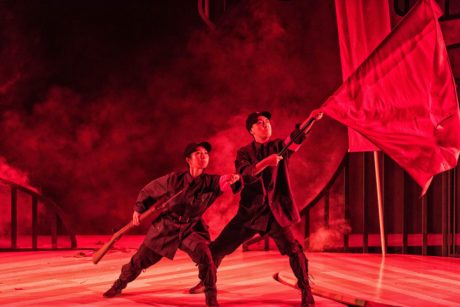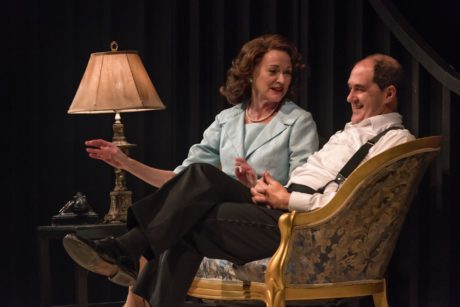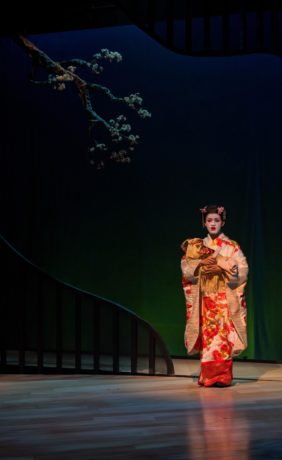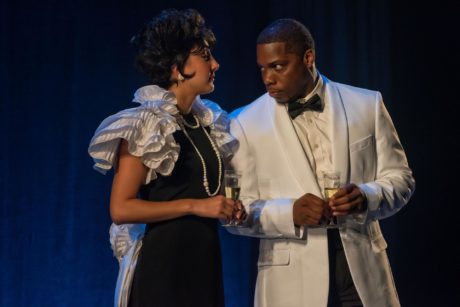Though written 30 years ago, few contemporary plays speak so profoundly to America’s current situation in the world as does David Henry Hwang’s M. Butterfly, now playing at Baltimore’s Everyman Theatre. A complex and compelling drama, M. Butterfly explores the psycho-cultural terrain of what celebrated author Edward Said called Orientalism: the West’s compulsion to romanticize and feminize the East.

Butterfly premiered on Broadway in 1988 and subsequently won the Tony, Drama Desk, and Outer Critics Circle Awards for best new play. A Broadway revival is scheduled for October of this year. Everyman’s production is much more than a warm-up to the revival: this Butterfly is a tiger of a show. Intellectually riveting, ironically funny, and emotionally nuanced, this Butterfly is not to be missed.
At the center of Hwang’s story are the real-life events upon which the play is loosely based.
The central character of Hwang’s fictional story is the French diplomat Rene Gallimard, played with an affectionate shyness by Bruce Randolph Nelson. Serving in China after the French defeat in Vietnam at Dien Bien Phu in 1954, Rene attends a rendition of the death scene from the Puccini’s Madame Butterfly.
In the opera, Pinkerton, a US sailor, buys and, then, marries a 15-year-old Japanese girl, Butterfly. He impregnates her and then leaves. He returns three years later, married to an “American” girl. Butterfly, who is still in love with her American sailor, does the honorable thing: she commits suicide.

In Hwang’s M. Butterfly, the arrogantly Western Rene does not realize that, in China, female opera characters are played by men. He meets the “actress” playing Butterfly, Song Liling, and is immediately infatuated, even though the “actress” makes no attempt to hide his identity post-performance.
Carl Jung would be more than pleased by the power of Rene’s archetypal projection of the feminine upon Song’s masculine.
The “actress” Song is played with engrossing precision by Vichet Chum. In fact, the subtlety of Chum’s performance is what gives this production of M. Butterfly its unique power. He deftly shifts from a man playing a female opera character to a man playing a woman who, as a communist spy, seduces Rene to a man playing a Western man in suit and tie, wanting nothing more than to be accepted for who he is.

Both Chum and Nelson handle to script’s complex layering wonderfully, with director Vincent M. Lancisi calling the shots. His insight into the play’s structure and thematic unity is spot-on excellent.
Butterfly’s supporting cast also does a fantastic job, beginning with a strong multi-character performance by Yaegel T. Welch. His fun-loving Marc and stand up Sharpless represent stark contrasts to Nelson’s relatively humorless Rene.
Deborah Hazlett plays Rene’s wife, Helga, the good wife, until of course she’s had enough of the duplicitous Rene.
Tuyet Thi Pham also does a superb job portraying a host of characters, from the dogmatic Comrade Chin to the demure handmaid Suzuki.
Rounding out the cast is Christopher Bloch who plays Rene’s good-natured boss, M. Toulon, as well as others; Katharine Ariyan who plays the Danish coed, Renee, who then becomes Rene’s uninhibited lover; and Brett Messiora and Mika J. Nakano whose portrayal of the Beijing Opera, Socialist style, was wonderful to watch.
Yu-Hsuan Chen’s sets for this presentational script were simple and elegant, leaving not a sharp edge or a straight-line to behold. Lighting by Jay Herzog delineated spaces and provided excellent focus. Costumes by Eric Abele were characteristically clear and lush. Fabian Obispo provided the Sound Design and the compositions that channeled the emotional undertones of the play.
There’s no doubt that Hwang’s M. Butterfly is a masterpiece of contemporary drama. Although its production requirements make it a challenge to stage, Everyman Theatre has done a first rate job delivering the goods.
As we enter the 17th year of our longest war, in Afghanistan, and continue our other Eastern wars in Iraq and Syria, even as the 60-year-old ceasefire in Korea becomes increasing frayed under mounting tension, perhaps Hwang’s psycho-cultural gaze at Western masculinity, both as sexual predator and military machine, is just what history ordered.

The Vietnam War is not really that long ago and its real lessons are definitely worth learning. David Henry Hwang’s M. Butterfly gives everyone a chance to sit back, enjoy, and think about just how wrong everyone can be.
Running Time: Two hours and 30 minutes, which includes a 15-minute intermission and a 5-minute intermission.
M. Butterfly plays through October 8, 2017, at Everyman Theatre – 315 West Fayette Street, in Baltimore, MD. For tickets, call the box office at (410) 752-2208, or purchase them online.




